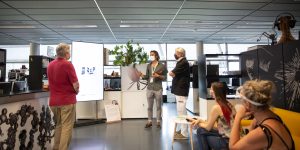
Projects
Projekte
-
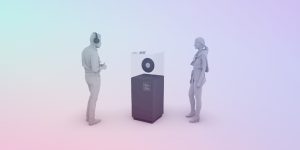
Memo Futurum
Zukunftsvisionen über die Zeit hinweg teilen
Memo Futurum ist eine Einladung, sich mit unseren persönlichen und kollektiven Zukunftsvisionen auseinanderzusetzen. Die Öffentlichkeit konnte sich über die Website beteiligen und bis Ende 2021 eine Sprachnachricht einreichen. Die Beiträge wurden dann auf Schallplatten übertragen, die erst in 25 Jahren wieder geöffnet werden, wenn der Zyklus von Neuem beginnt.
-
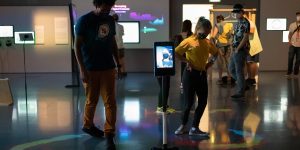
OutReach
Physische Interaktion für Telepräsenzroboter
OutReach ist eine Lösung, die die Stärken von Telepräsenzrobotern ausspielt. Indem Lichtschalter, Aufzugsknöpfe oder andere Bedienelemente in einem bestimmten Umfeld um ferngesteuerte Aktoren erweitert werden, ermöglicht OutReach die Interaktion mit der entfernten Umgebung.
-
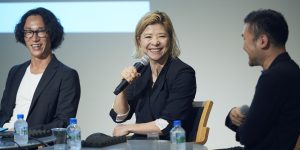
Ars Electronica Tokyo Initiative
Gemeinsam für Innovation und Gesellschaft
Seit 2014 arbeiten Hakuhodo and Ars Electronica am gemeinsamen Projekt Future Catalysts. Um diese Aktivitäten zu erweitern, gründeten die beiden Institutionen die ARS ELECTRONICA TOKYO Initiative (AETI): eine Innovations-Community mit einer Mission.
-
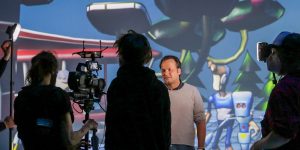
Deep Virtual
Videos mit hybrider Realität in Echtzeit
Das neue Videoproduktionssystem Deep Virtual ist in der Lage, virtuelle und physische Realität in Echtzeit zu verschmelzen und diese hybride Realität verzögerungsfrei zu übertragen. Mit seiner Entwicklung hat das Ars Electronica Futurelab einen Meilenstein in der Geschichte des Deep Space 8K gesetzt, denn das Konzept für hybride Live-Videoproduktion bringt die Übertragung virtueller Illusionen einen entscheidenden…
-
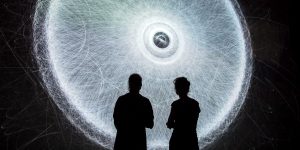
Resonant Media
Ausstellung rund um 8K-Visualisierung
„Resonant Media – Possibilities of 8K Visualization“ verfolgte einen künstlerischen und wissenschaftlichen Ansatz, um die neuen Möglichkeiten von 8K aus verschiedenen Perspektiven zu erkunden. Die Ausstellung in Tokio im Jahr 2021 präsentierte eine Vielzahl von Projekten, die die Zukunft von 8K über den bestehenden Rahmen hinaus erforschten.
-
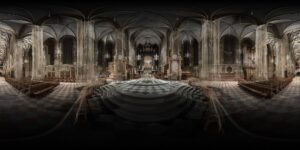
The Translucent St. Stephen’s Cathedral
Immersive Reise in stereoskopischem 8K
Im Rahmen des europäischen Forschungs- und Entwicklungsprojekts Immersify wurden die Daten aus der räumlichen Vermessung des Stephansdoms in Wien mit mehr als 21 Milliarden Laserpunkten in eine durchscheinende Darstellung der Kathedrale umgewandelt. Das Ergebnis ist eine innovative interaktive und immersive Reise durch das Gebäude in stereoskopischem 8K im Deep Space 8K des Ars Electronica Center.
-
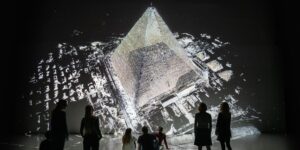
The Great Pyramid in 3D
Reise durch das antike Weltwunder in 12K
The Great Pyramid in 3D, From the BBC Series Ancient Invisible Cities ist ein interaktives, immersives Erlebnis für den Deep Space 8K des Ars Electronica Center. Besucher*innen tauchen virtuell tief in das älteste Weltwunder der Antike, die Cheops-Pyramide, ein. Sie können sich interaktiv durch die 360°-3D-Umgebung mit 12K-Auflösung bewegen, mit Raumklang und Original-Soundtracks sowie Expert*innen-Kommentaren.
-
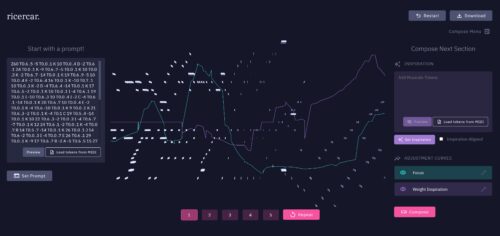
Ricercar
Interaktives KI-Kompositionssystem
Was bedeutet es, gemeinsam mit einer Maschine zu komponieren? Welche Formen musikalischer Autorschaft entstehen, wenn generative Systeme nicht mehr nur als Werkzeuge funktionieren, sondern sich aktiv in künstlerische Prozesse einschalten? Ricercar ist eine Forschungssoftware, die genau an dieser Nahtstelle zwischen menschlich-künstlerischer Intuition und maschineller Autonomie ansetzt – nicht um diese Spannung aufzulösen, sondern um sie…
-
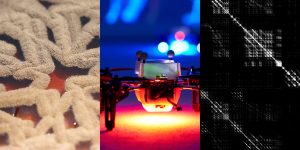
Future Ink
Wo ist meine Seele in der Kreativität?
Das Future Ink Project ist ein Forschungsprojekt rund um die Zukunft der Kreativität unter Berücksichtigung aller Aspekte von Tinte. Im Rahmen von Future Ink wurden verschiedene Prototypen entwickelt, von der Verwendung von Tablets und Drohnen zum Malen bis zur Visualisierung von Gehirnströmen und Körpersignalen als immersive dreidimensionale Tinte.
-
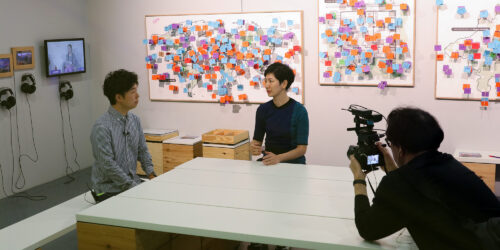
Art Thinking Initiative
Ars Electronica x Hakuhodo
Die Art Thinking Initiative (ATI) ist ein gemeinsames Beratungsprogramm des Ars Electronica Futurelab und Hakuhodo mit dem Ziel, die Methode des Art Thinking in das Management sowie in die Forschung und Entwicklung von Unternehmen, wissenschaftlichen Einrichtungen und öffentlichen Organisationen einzubringen. Hakuhodo ist ein führendes Unternehmen für Kommunikationsdesign und Marketinglösungen in Japan, dessen Kernphilosophie auf „People…

